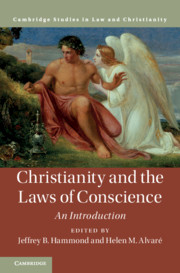Book contents
- Christianity and the Laws of Conscience
- Law and Christianity
- Christianity and the Laws of Conscience
- Copyright page
- Dedication
- Contents
- Contributors
- Acknowledgments
- Introduction
- Part I Themes in Understandings of Conscience in Christianity
- Part II Conscience According to Major Figures and Traditions
- 5 Conscience in the Early Church Fathers
- 6 St. Thomas Aquinas on Conscience
- 7 Reforming the Conscience
- 8 Toward a Theology of a Redeemed Conscience
- 9 Pierre Bayle
- 10 Freedom of Conscience and Its Right to Constitutional Protection
- 11 Jonathan Edwards on Conscience
- 12 Obeying God Rather Than Men
- 13 Mormonism and Conscience
- 14 Culture and Conscience in the Thought of Joseph Ratzinger, Pope Benedict XVI
- Part III Applied Topics in Law and Conscience
- Index
- References
14 - Culture and Conscience in the Thought of Joseph Ratzinger, Pope Benedict XVI
from Part II - Conscience According to Major Figures and Traditions
Published online by Cambridge University Press: 12 June 2021
- Christianity and the Laws of Conscience
- Law and Christianity
- Christianity and the Laws of Conscience
- Copyright page
- Dedication
- Contents
- Contributors
- Acknowledgments
- Introduction
- Part I Themes in Understandings of Conscience in Christianity
- Part II Conscience According to Major Figures and Traditions
- 5 Conscience in the Early Church Fathers
- 6 St. Thomas Aquinas on Conscience
- 7 Reforming the Conscience
- 8 Toward a Theology of a Redeemed Conscience
- 9 Pierre Bayle
- 10 Freedom of Conscience and Its Right to Constitutional Protection
- 11 Jonathan Edwards on Conscience
- 12 Obeying God Rather Than Men
- 13 Mormonism and Conscience
- 14 Culture and Conscience in the Thought of Joseph Ratzinger, Pope Benedict XVI
- Part III Applied Topics in Law and Conscience
- Index
- References
Summary
Peter Casarella presents the themes in Joseph Ratzinger/Benedict XVI’s reflection on conscience. An important part of Benedict’s theory is his theology of culture. Current ideas about conscience and culture minimize truth. Benedict posits that conscience is a law on the heart and is not merely consciousness. He submits that culture points to the unveiling of a Redeemer. He proposes “interculturality,” the meeting of cultures in which their hope for Advent is kept. Regarding truth and conscience, Benedict works with Newman and Socrates. He concludes that conscience is the voice of truth in the subject. Benedict’s theory of conscience hews the Thomistic line between synderesis and conscience as an act of judging upon a good. Benedict guards against relativism by suggesting that synderesis can be known by the Platonic idea of anamnesis: memory of the true and good. This is tied to Benedict’s anthropology, namely humans’ reliance upon God and capacity for dialogue with Him. Though social circumstances can be sources of moral knowledge, the person should consult God’s will. Consciences are formed through Scripture, the Holy Spirit, the magisterium, beauty, and identification with Christ.
Keywords
- Type
- Chapter
- Information
- Christianity and the Laws of ConscienceAn Introduction, pp. 265 - 284Publisher: Cambridge University PressPrint publication year: 2021

